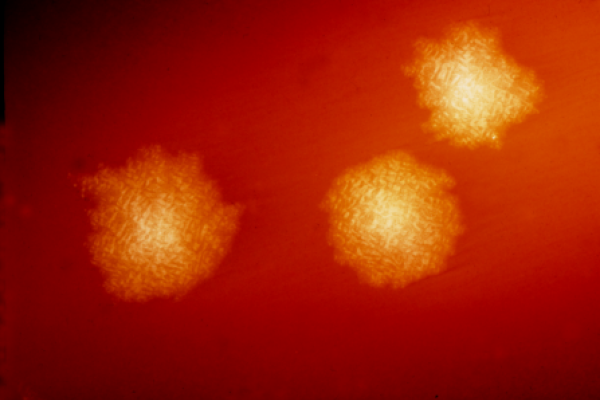Plant-based compound that prevents infectious biofilm formation

Bacterial colonies. Image: CDC/Dr. Holdeman. Centers for Disease Control and Prevention’s Public Health Image Library (PHIL). Public Domain,
Research from the University of New England (UNE) showcases the potential effectiveness of certain plant-based compounds in preventing hospital-acquired infections, with implications for decreasing the prevalence of antibiotic resistance.
The scientists set out to explore methods for reducing biofilm formation for two types of Staphylococcus bacteria that are prone to causing infections in hospitals, notably on in-dwelling medical devices such as catheters or surgical implantations.
The bacteria studied were Staphylococcus aureus and Staphylococcus epidermidis. These organisms are among the leading causes of such infections and are notable for their robust ability to form biofilms.
Biofilms are communities of microorganisms attached to a surface that play a significant role in the persistence of bacterial infections. The organisms within a biofilm are often more resistant to antibiotics than planktonic bacteria.
With biofilm formation, layers of bacteria are trapped in a slimy secretion (an extracellular matrix) that can accumulate on various types of surfaces and which confers protection.
Biofilms that form inside the human body can break off and travel through the bloodstream, attaching themselves to organs like the heart and causing sometimes life-threatening infections.
To counter this in certain circumstances, the researchers attempted to test the ability of pyrogallol, a phenolic compound used in several clinical applications for its anti-inflammatory effects, to disrupt biofilm formation.
The researchers exposed four strains of Staphylococcus to varying concentrations of pyrogallol. Through observation, the team determined that pyrogallol successfully prevented biofilms from forming in Staphylococcus samples, although the compound did not reduce the prevalence of existing biofilms.
Additional testing, however, revealed that pyrogallol inhibited biofilm formation by causing bacterial oxidative stress, demonstrating that oxidative stress is an effective mechanism in preventing staphylococcal biofilms from forming.
The findings additionally show promise for reducing the need for broad-spectrum antibiotics in hospital settings, which research has suggested may lead to further antibiotic resistance.
Pyrogallol prevents these bacteria from doing what they need to do to cause infection.
The study appears in the Journal of Applied Microbiology, titled: “Pyrogallol Impairs Staphylococcal Biofilm Formation via Induction of Bacterial Oxidative Stress.”
Plant-based compound that prevents infectious biofilm formation
#Plantbased #compound #prevents #infectious #biofilm #formation





